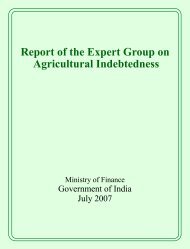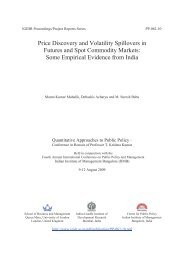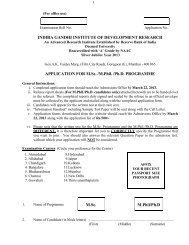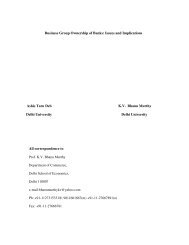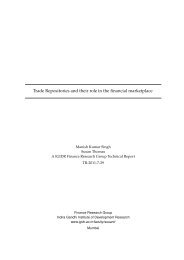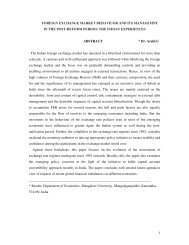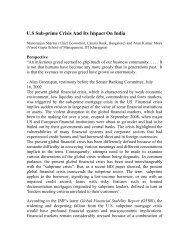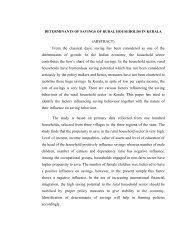IGIDR Annual Report 2008-2009 - Indira Gandhi Institute of ...
IGIDR Annual Report 2008-2009 - Indira Gandhi Institute of ...
IGIDR Annual Report 2008-2009 - Indira Gandhi Institute of ...
- No tags were found...
You also want an ePaper? Increase the reach of your titles
YUMPU automatically turns print PDFs into web optimized ePapers that Google loves.
Research Activitiesconflicts among the objectives <strong>of</strong> the parties involved,which are akin to agency relations.The paper ―Governance <strong>of</strong> Natural Resources in India:Property Rights, Legal Pluralism and Other Issues‖ inN. C. Narayana ed. State, Natural Resource Conflictsand Challenged to Governance- Where Do We GoFrom Here? Academic Foundation, <strong>2008</strong>, by NirmalSengupta, traces the evolution <strong>of</strong> legal andadministrative provisions pertaining to common poolresources in India in order to understand the currentstate and the sources <strong>of</strong> some major problems.Corporate GovernanceThe paper by Jayati Sarkar and Subrata Sarkar titled―Multiple Board Appointments and Firm Performancein Emerging Economies: Evidence from India,‖ PacificBasin Finance Journal, Volume 17, April <strong>2009</strong>, 271-293, extends the literature on multiple directorships,busy directors and firm performance by providingevidence from an emerging economy, India, where theincidence <strong>of</strong> multiple directorships is high. Using asample <strong>of</strong> 500 large firms and a measure <strong>of</strong> "busyness"that is more general in its applicability; they findmultiple directorships by independent directors tocorrelate positively with firm value. Independentdirectors with multiple positions are also found toattend more board meetings and are more likely to bepresent in a company's annual general meeting. Thesefindings are largely in contrast to the existing evidencefrom the US studies and lend support to the "qualityhypothesis" that busy outside directors are likely to bebetter directors, and the "resource dependencyhypothesis" that multiple directors may be betternetworked thereby helping the company to establishmore linkages with its external environment. Multipledirectorships by inside directors are, however,negatively related to firm performance. The results <strong>of</strong>this paper suggest that the institutional specificities <strong>of</strong>emerging economies like India could work in favour <strong>of</strong>sustaining high levels <strong>of</strong> multiple directorships forindependent directors without necessarily impairing thequality <strong>of</strong> corporate governance.In the paper ―Board <strong>of</strong> Directors and OpportunisticEarnings Management: Evidence from India‖published in Journal <strong>of</strong> Accounting, Auditing andFinance, Vol. 23, No. 4, December, <strong>2008</strong>, 189-208,Jayati Sarkar, Subrata Sarkar and Kaustav Sen (PaceUniversity, New York) investigate the impact <strong>of</strong> boardcharacteristics on opportunistic earnings managementin the context <strong>of</strong> a large emerging economy, India.While the role <strong>of</strong> company boards in earningsmanagement has been examined in developed marketssetting, particularly the US and UK, understandingtheir effectiveness in emerging markets like India isparticularly important due to differences that exist inthe structure <strong>of</strong> business organizations across thesemarkets. Using a sample <strong>of</strong> 500 large Indian firms, theyanalyse the effect <strong>of</strong> board independence on earningsmanagement as has been the focus <strong>of</strong> most existingstudies, and extend the existing literature by includingcharacteristics <strong>of</strong> directors that proxy for the ―quality‖<strong>of</strong> both inside and outside directors that are likely toimpinge on the effectiveness <strong>of</strong> boards in curbingearnings manipulation. Their results indicate that it isnot board independence per se, but rather board qualitythat is important for earnings management. Theirresults show that diligent boards are associated withlower earnings manipulation, while boards that havelarge number <strong>of</strong> multiple directors exhibit higherearnings management. With respect to inside directors,their results indicate that CEO-duality and presence <strong>of</strong>controlling shareholders on the board increasesearnings management. They also find that domesticinstitutional owners, one <strong>of</strong> the key control variables,mitigate earnings management and acts as acompensating control mechanism to the presence <strong>of</strong>controlling shareholders on corporate boards.The chapter by Jayati Sarkar titled ―Business Groups inIndia‖ (forthcoming in the Oxford Handbook <strong>of</strong>Business Groups edited by Asli M. Colpan, TakashiHikino and James R. Lincoln, Oxford University Press)aims to examine the evolution <strong>of</strong> family businessgroups in India, one <strong>of</strong> the fastest growing emergingeconomies in recent times and a country where<strong>Indira</strong> <strong>Gandhi</strong> <strong>Institute</strong> <strong>of</strong> Development Research 23



